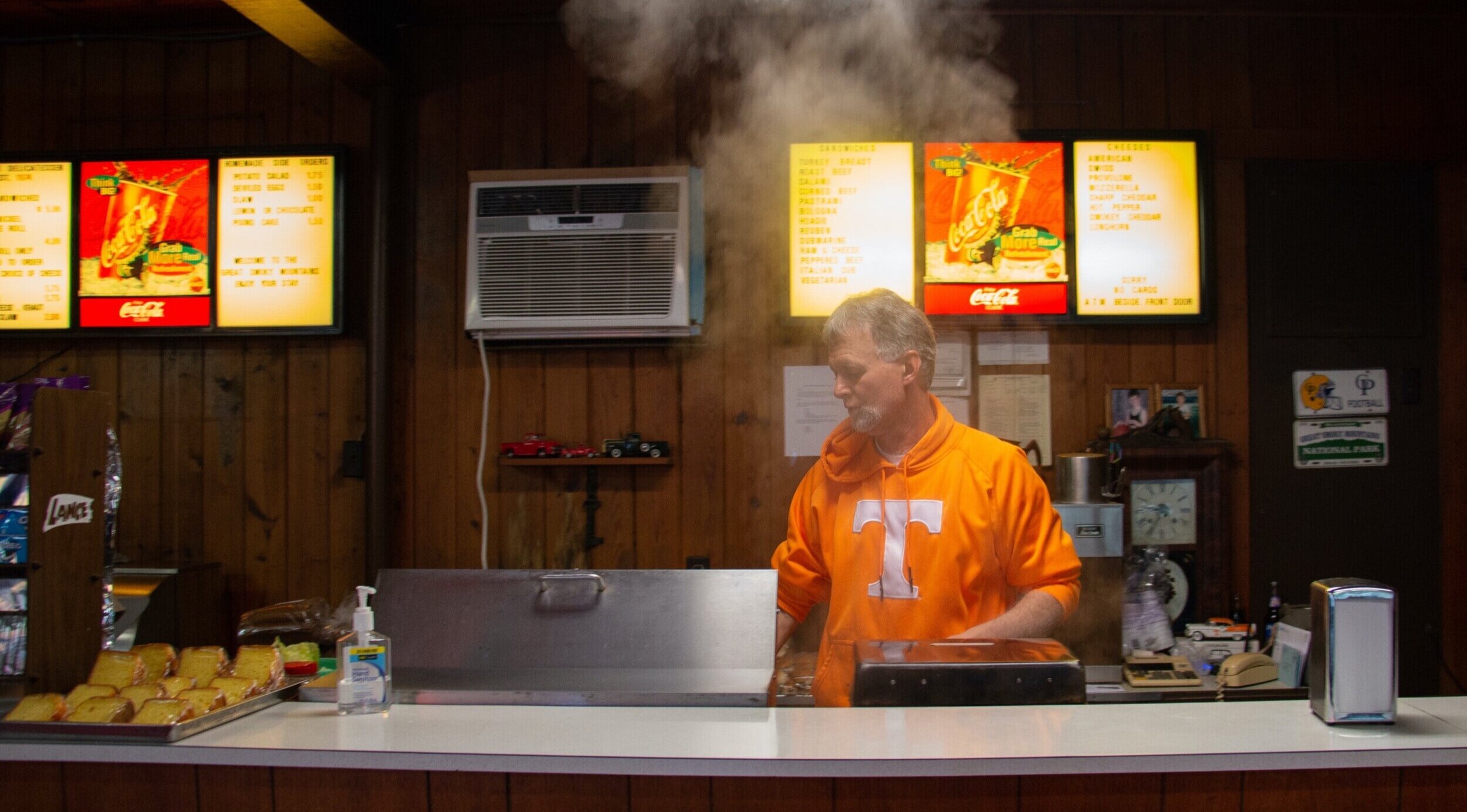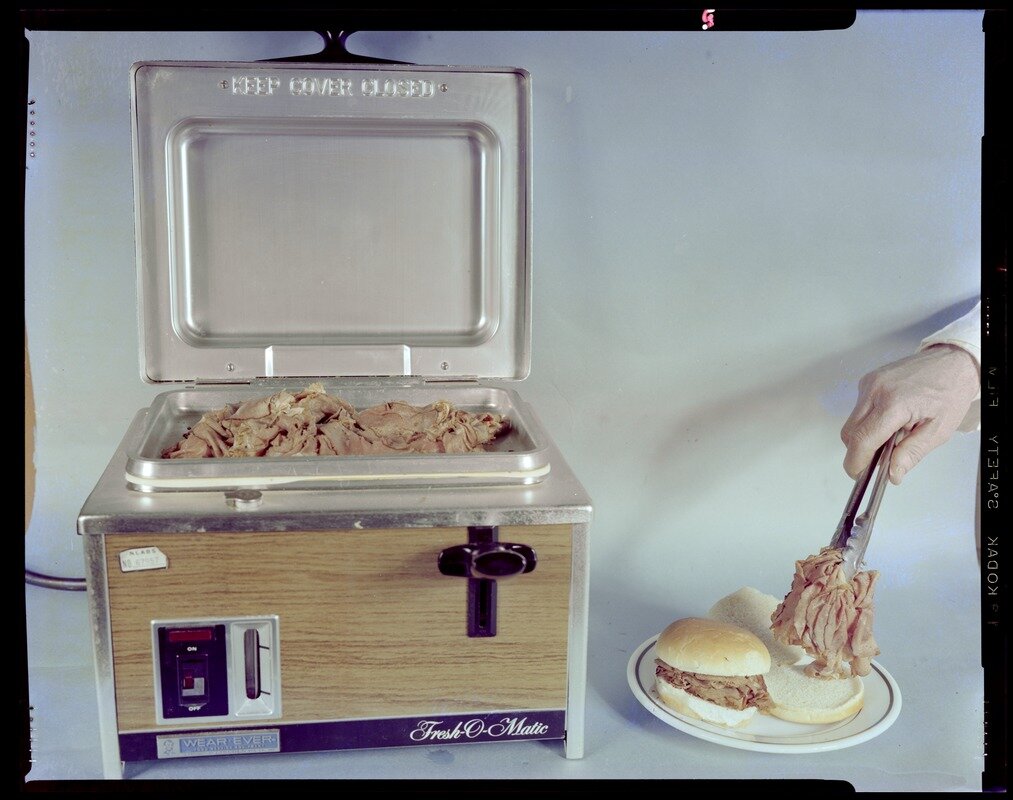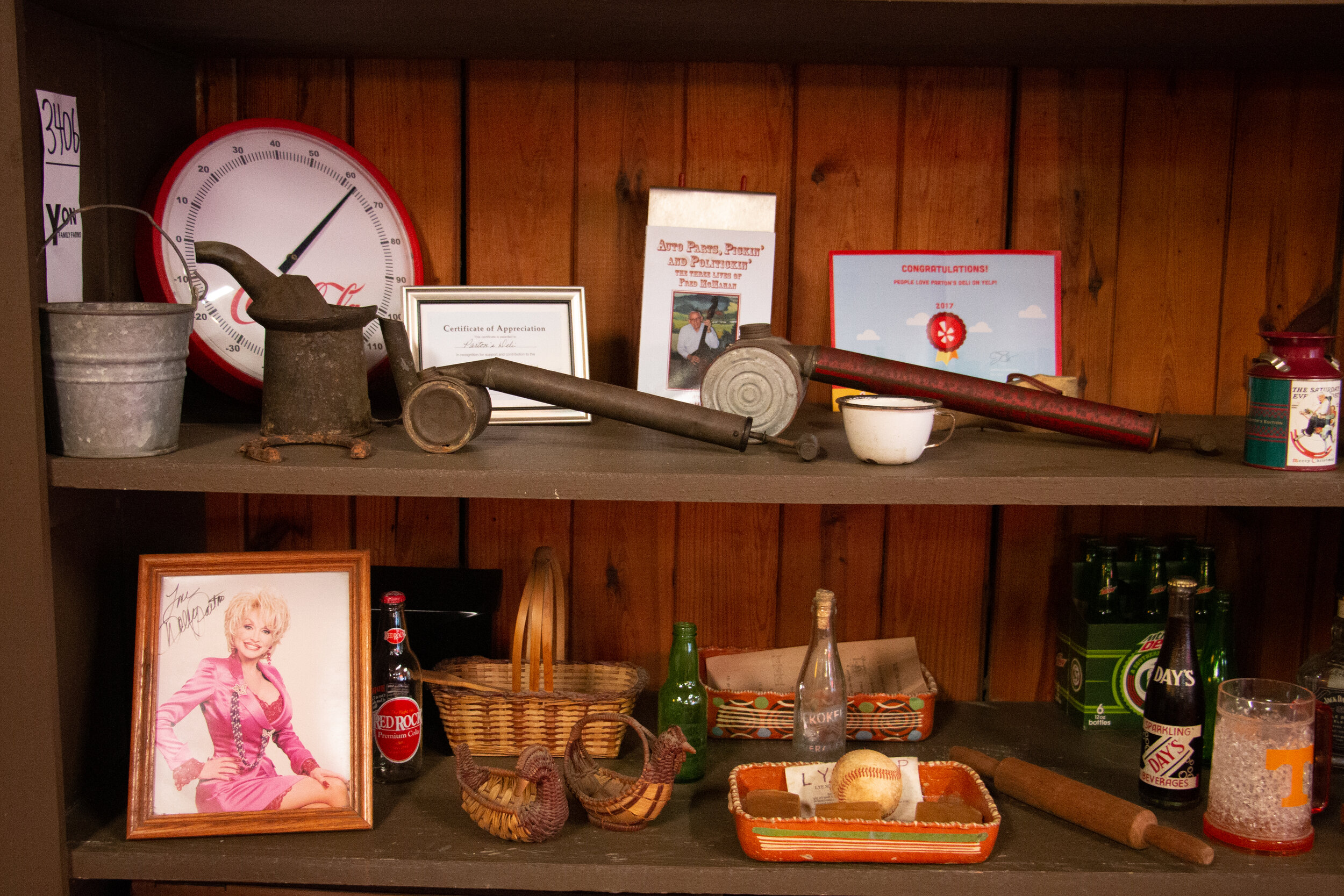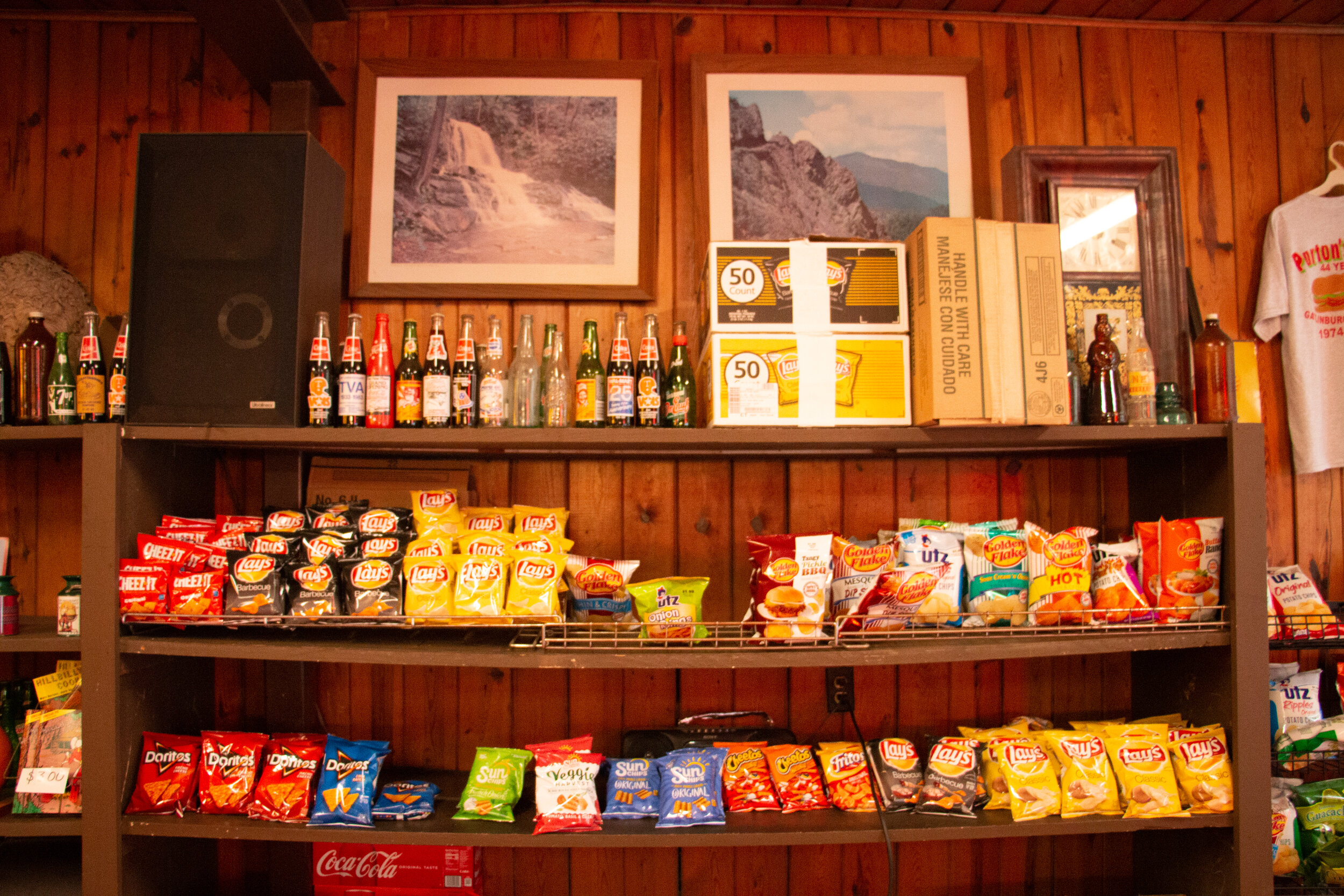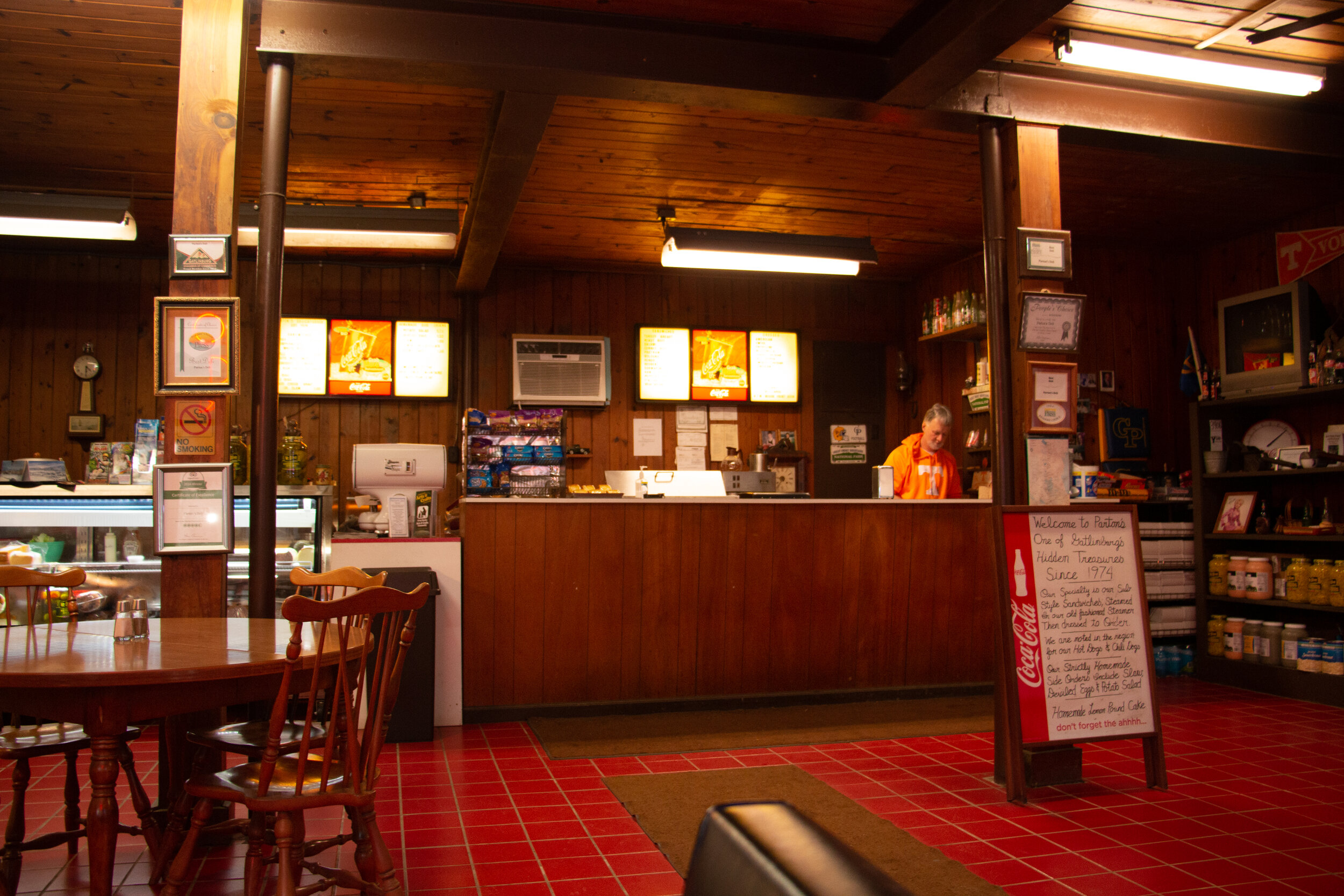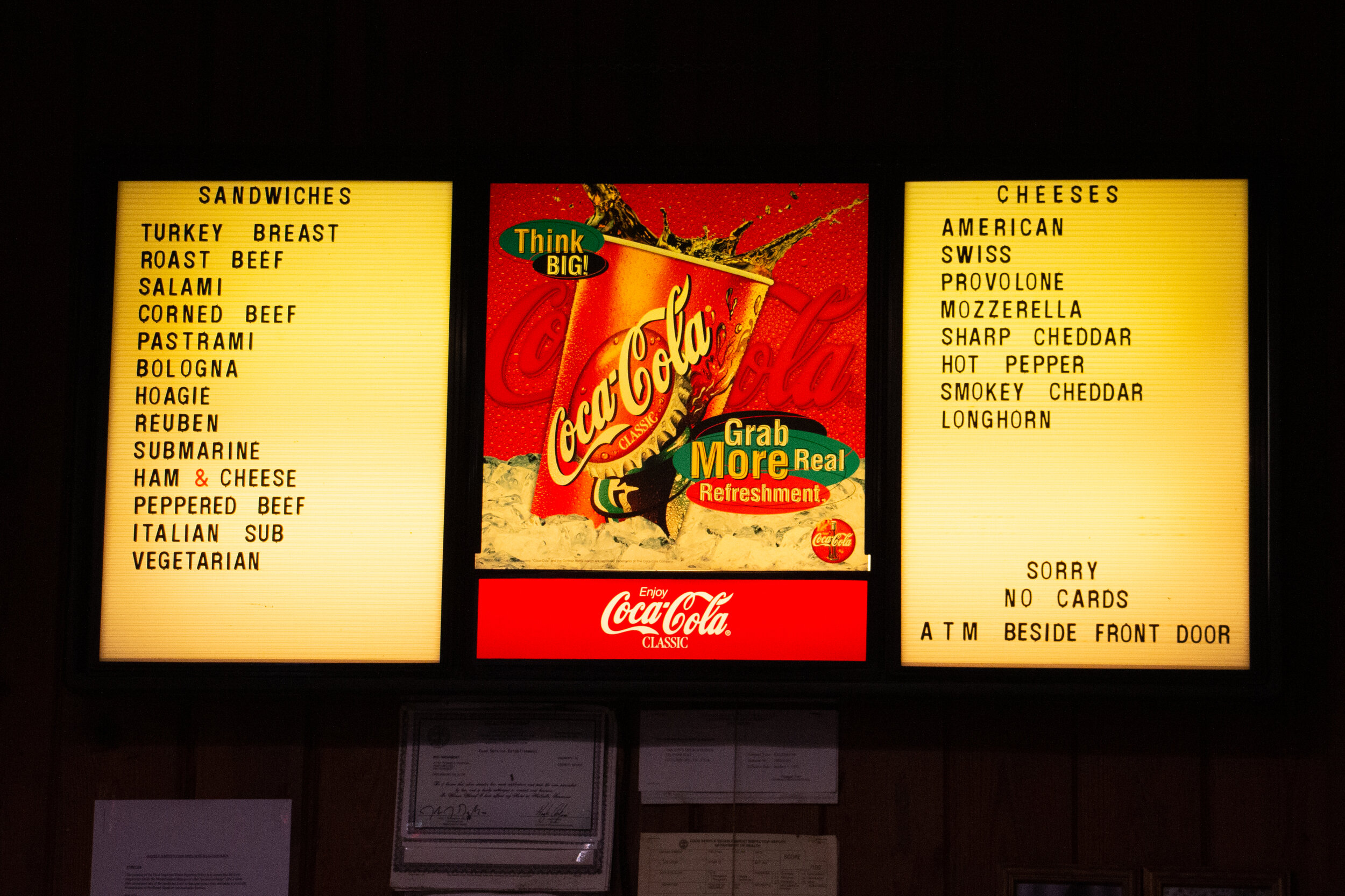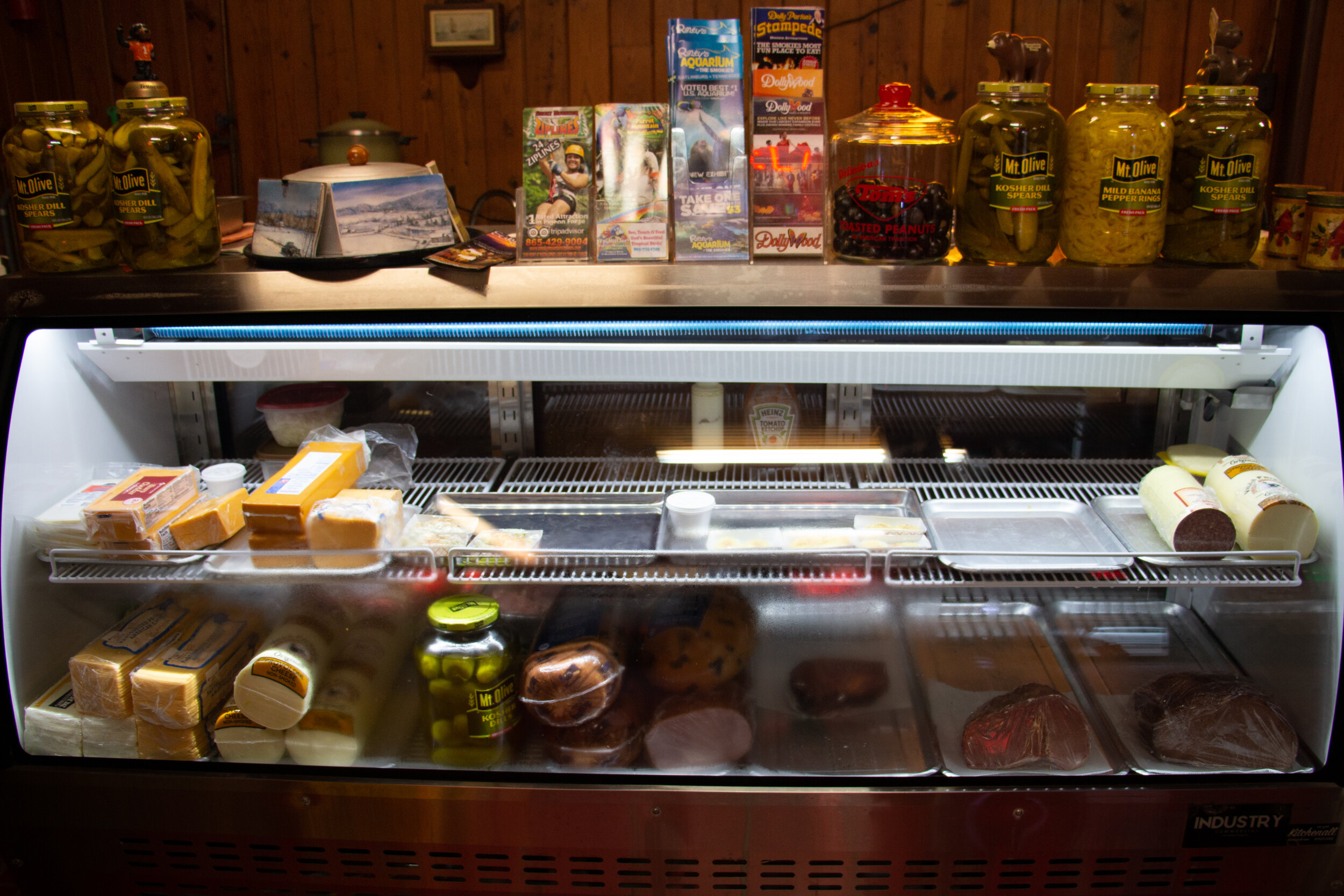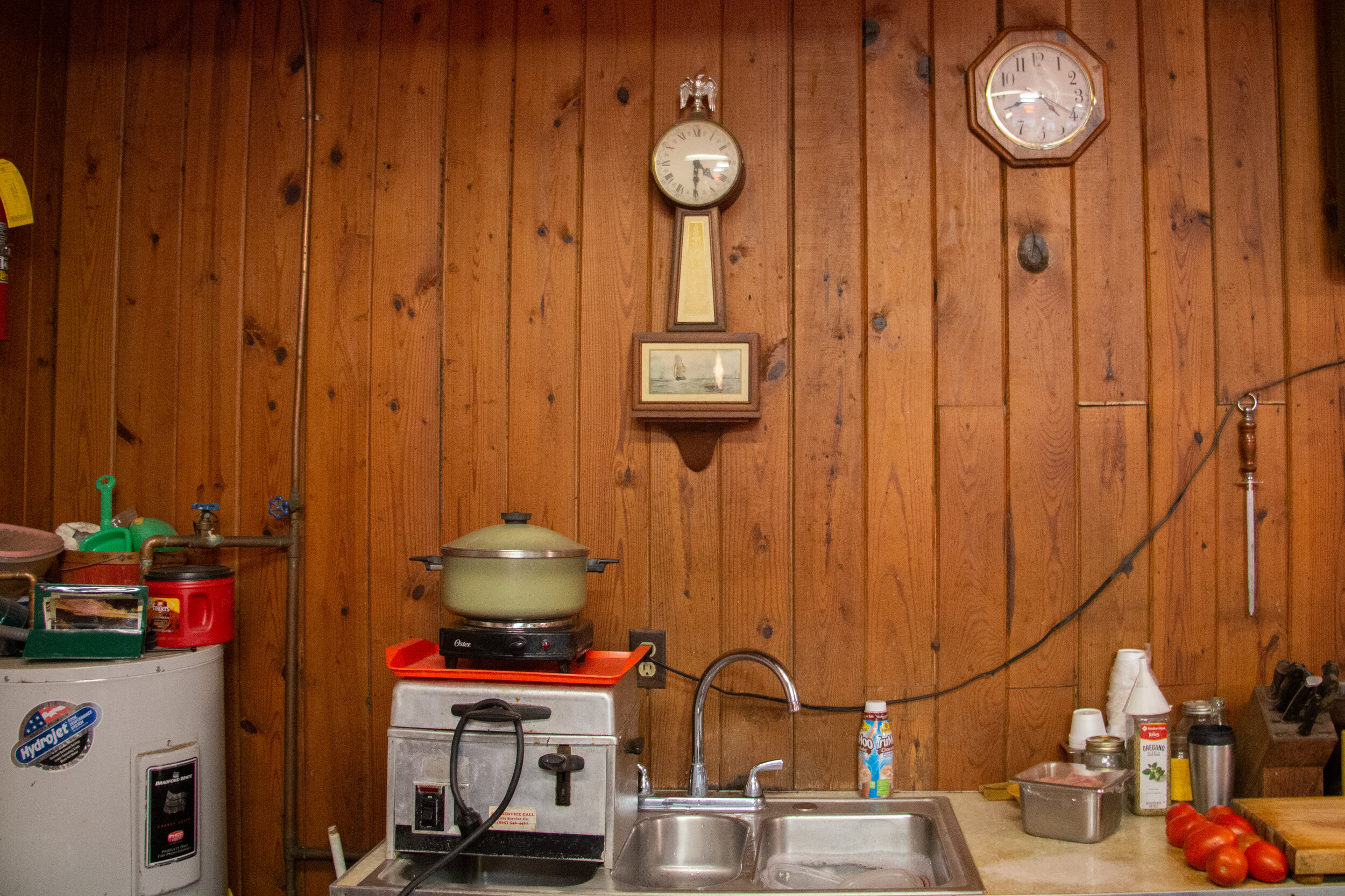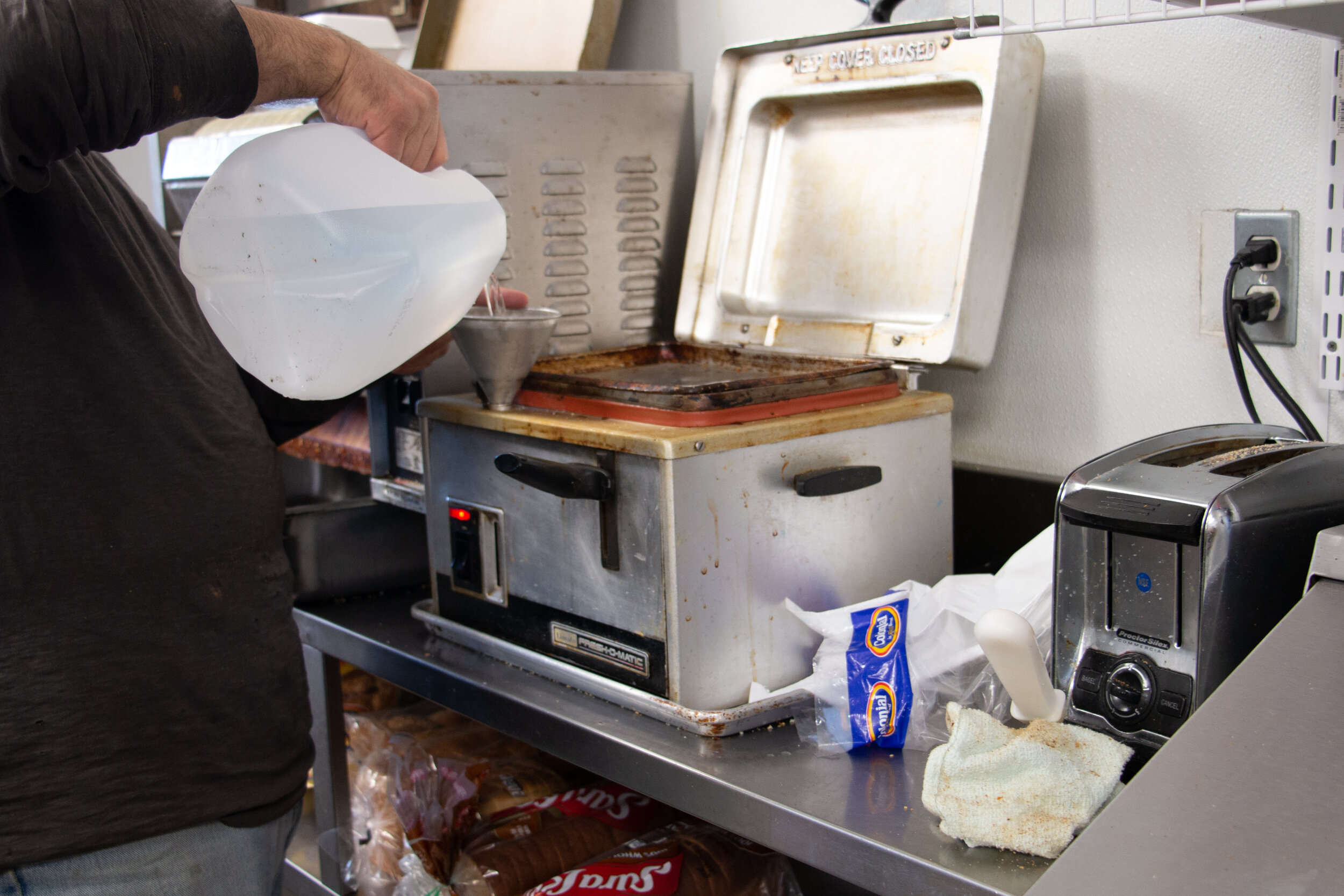In the mountains of East Tennessee, folks have a particular fondness for a sandwich that’s spent a few seconds in a Fresh-O-Matic steamer. Knoxvillians know that soft-bread love in their bones, but nobody seems to know exactly where it comes from. Chelsey Mae Johnson aimed to find out.
Story & Photographs by Chelsey Mae Johnson
Nights when my mom only wanted popcorn and beer for dinner, she’d send us down to see Faye.
We lived in South Knoxville, in a mid-century subdivision full of bad drivers — a dicey mix of old people and teenagers. I was always careful to stay off the shoulderless road, keeping my little sister corralled on the safe side as we tramped along on so many sticky Tennessee summer evenings, our light-up sneakers collecting cut grass. About a quarter-mile down the hill from our house sat a low cinderblock building shaped like a brick, its white paint speckled with adornments in always-fresh Volunteer orange. It was the first place we were allowed to go by ourselves.
The Korner Market & Deli was not a quaint country store. It was a purpose-serving place, anchoring the neighborhood in a way that was becoming dated even in the early 1990s. I learned the word “loitering” as soon as I could read, sounding out the hand-lettered rules on the side of the building while my mom ran in to grab an emergency bag of hotdog buns, or Cokes and Winstons for my visiting grandparents. Inside, Faye cashed checks, ran the grill, and recognized our phone number when it popped up on her caller ID. Underneath a halo of cigarette smoke, she gave hell to whoever else was posted up at the counter.
Faye would nod toward us as the door clanged and holler out, “Hey girls. How’s your momma ’n’ ’em?”
“Momma says hi,” we’d say, barely looking up on our way to the candy aisle. We’d hand over a ten at the counter and head back up the hill with a heavy plastic bag smelling like fries, Styrofoam boxes squeaking with each step, a secret slab of Laffy Taffy tucked into the back pocket of my sister’s cutoffs. Occasionally my mom or aunt would spring for a burger — occasionally my mom’s friends made the trip out to our house just for that burger — but my sister and I never deviated: There was always a hoagie in that bag. Always ham and Swiss, on dark bread, mayo only. Always steamed.
The Korner Market & Deli was not a quaint country store. It was a purpose-serving place, anchoring the neighborhood in a way that was becoming dated even in the early 1990s.
With high school and a driver’s license came the wild opportunity to make lunch an act of rebellion. I would grit my golden-child teeth and stroll confidently out into the parking lot at 12:20, as if I were a person who regularly did bold, adult things, like leave campus without permission. My best friend Cassie was usually along for this thrill, and we would bolt to the nearby gas station advertising Cold Beer * Tobacco * Market * Deli. Our high school sat just off a nearly empty seven-mile stretch of state highway between two larger and more important roads. The Bi-Lo was the only place near enough to grab a sausage biscuit on your way to first period. Its parking lots, where we held car-wash fundraisers or arranged off-campus fights after school, was the first place we ate on our own.
Back in the school’s parking lot, we’d peel the foil off our sandwiches, gossiping and giggling, washing that stolen half-hour down with weightless frozen Mountain Dew swirled into giant foam cups. Imagine it in Kodachrome: two teenage girls enjoying gas station food without the intrusion of irony or Instagram. Week in and week out, our orders were an early exercise in the comfort of sameness. Always hoagies. Always steamed.
All Knoxvillians know about steamed sandwiches. In fact, all Knoxvillians know steamed sandwiches so very deeply in their consciousness that they rarely consider their standard hot-ham-and-cheese has, in fact, been steam-heated. It’s so widespread — such a default — that most people seem puzzled if you poke around to find out why we do it this way. You get a lot of shrugs, a lot of “Well. I never really thought about it.”
In Knoxville, we understand hot deli sandwiches are called hoagies; we understand they should be soft and squishy; we understand (at least implicitly) they should be made that way by a joyride in a Fresh-O-Matic steamer, which is about the size of a big microwave and retails for $1,370.
Photo via Natick Soldier Systems Center Photographic Collection, 1976
In 2009, The New York Times offered readers a chance to fire questions about regional foods to foodways historian John T. Edge, executive director of the University of Mississippi’s Southern Foodways Alliance. Of the 25 questions posed in the comments, two asked for an elucidation of the Knoxville tradition of steaming sandwiches. Edge dismissed the question by telling us, “Steamers are embraced elsewhere,” then got back to a narrative concerning the nuanced terroir of barbecue sauce.
Steaming appliances may be embraced elsewhere, but I’m certain it is only in Knoxville that you could lift the lid of one and expect to find a hoagie there. While I am aware of the great power of the collective American consciousness to ruin anything regional and peculiar — last year, thousands of people lost their minds on Twitter when they found out that St. Louisans prefer to slice a bagel like a Texan slices a brisket — I am here nonetheless to stand tall and tell you: This is special. There are half a million hillbillies in East Tennessee who have been steaming each and every one of their hoagies for over 50 years.
It took several years of moving around after college to grasp it: There were no steamed sandwiches to be found in the Carolina Lowcountry, or on the West Coast, or even in Nashville. By the time I moved back to North Carolina in 2019, I had gone from hoagie-curious to hoagie-obsessed. I wanted to know exactly when and why we started steaming hoagies in Knoxville, but no one I spoke with knew. If I wanted the truth, I would have to dig it up myself.
As Knoxville historian Jack Neely graciously warned me in the early days of my search for the steamed-sandwich big bang, it’s often difficult to trace the paths of even the most well-known historical foodways. In earlier decades, Neely said, people didn’t think low-culture facets of everyday life like mountain music, utilitarian clothing, or corner-store foods were significant enough to write about. As a result, there’s often very little published on local restaurant trends in older newspapers and books. It’s easy enough to find out when proprietors applied for liquor licenses or needed to hire extra hands, but it’s rare to find pre-internet photos of menus or restaurant interiors. Keeping that in mind, I thought it best to start my investigation broadly.
According to The Oxford Companion to American Food and Drink, the term “hoagie” first appeared (sort of) in Philadelphia in 1936: “After witnessing a friend devour a large sandwich and thinking he was a hog to eat it all at once,” sandwich shop proprietor Al De Palma introduced a pile of cold cuts on a long Italian roll and called it a “hoggie.” Soon, “competitors in the Philadelphia area copied his sandwich and sold it under various names, including hoogie, hogie, and horgy. By 1950 … the sandwich became commonly known as the hoagie.” The Companion maintains this was the first instance of the “submarine” style of sandwich, which spread quickly throughout the Northeast and then the greater U.S., taking on many names. The Companion never mentions the term “hoagie” being used outside of Philadelphia and New Jersey; its only further specification is that the sandwich be made to order.
Hoagie from the sunrise deli
The first occurrence of the word “hoagie” in the Knoxville News Sentinel appears in 1961, in a help-wanted ad that would never fly today: “Waitress — Preferably unexperienced, age 19 to 22. Work near college campus in Knoxville’s new and original HOAGIE HOUSE — Cumberland and Eighteenth.” As best I can tell, the Hoagie House never opened. This does not render the listing insignificant; in 1961, Greek immigrants Sam and Andy Captain (née Kapitanopolous) were already operating a diner called The Tennessean at that same intersection on the University of Tennessee Campus. And they had been since 1946.
Nine years into The Tennessean’s existence, in 1955, the first super-heated food steamer hit the American market: the Wear-Ever Fresh-O-Matic. After exhaustive research, I’m still unsure how the Fresh-O-Matic was first marketed, but the record clearly suggests it was always sold as a commercial product. (And the 1955 date satisfies my own nagging curiosity as to why no hoagie-sellers are included in the abundant Knoxville café references in Cormac McCarthy’s Suttree. The novel is set in 1951.) To Neely’s earlier point, nobody thought to write an article for the News Sentinel celebrating the Fresh-O-Matic first hitting the foothills, so the dates of the earliest sales here remain a mystery. However, the first appearance of a used model for sale in the News Sentinel classifieds appears in April of 1963, in an ad for an auction closing out the old Star Drive-In in Sevierville. It is listed at $229.50, about $1,935.38 in today’s dollars.
By 1967, Bill Captain, nephew and employee of the brothers, was tootling around campus in his Hoagie Wagon, selling “hamburgers, hot dogs, hoagies [and] all kinds of sandwiches.” The News Sentinel reports steam tables, but by this time, I suspect there were also Fresh-O-Matic steamers involved. The building at 18th and Cumberland had been subdivided, and there, in 1969, the brothers announced the opening of a deli within their Roman Room Bar. In the 1970s, the deli became known simply as Sam & Andy’s, and by then they were cranking out steamed hoagies by the thousands to feed the constant hordes of hungry, drunken college kids.
Every UT alum from 1965 to 2000 seems to remember (or, “remember”) hitting Sam & Andy’s for late-night fortifications, and everybody remembers those soft, steamy, chewy sandwiches, but nobody seems to know precisely when the Fresh-O-Matic intersected with the hoagie. I asked Neely, hoping that as the doyen of Knoxville pop-history he would have some information long forgotten by other Vols of his generation.
“I had this romantic idea,” he said, “like something from a Ken Burns story. … I knew that before ever opening a restaurant, the Captains were hatmakers; therefore, they would have had steamers around the shop. I imagined that one day they just said, Hey! Let’s try these steamers on some sandwiches!”
Before I even realized that a folklore nugget of this caliber should be regarded with some suspicion, Neely let me down gently: “Unfortunately, that turned out not to be true.” However, he handed off a vague memory of having read something about the origin in a 1990s newspaper column, and that was enough to get me as close to the truth as I’ll ever get.
The on-campus Sam & Andy’s closed in April 1997. A few months later, News Sentinel columnist and reported hoagie enthusiast Shannon Stanfield ran an interview with their aforementioned nephew, Bill. Bill Captain had come over from Greece at age 16, and went from washing dishes at Sam & Andy’s to piloting the Hoagie Wagon to running his own deli, Vic & Bill’s, with yet another Captain cousin. Bill would have been 62 at the time of the interview, reflecting on almost five decades of making the sandwiches that would come to define his adopted city. Stanfield reported:
“Up in Yankeeland they like those cold sandwiches — and some of them up there heat the sandwiches up in the pizza oven or rotisserie ovens,” Captain says from behind his counter. “Hillbillies down here, they like that soft bread.”
Captain said [in the early 1960s] his uncle got a notion to put a cheese shop in the space behind the Roman Room and was checking out other such shops around the region.
“We went up to Asheville to look at a cheese shop, and on the way back saw a sign that said ‘Pickle Barrel Deli,’ so we turned around and went in there. The old boy had bagels and hoagie sandwiches that were frozen, and he would heat them up in a steamer,” Captain says. “We had a hoagie, and it was pretty good. Before then, the only steamer we ever saw was the Blue Circle’s, and they used them to warm up the hamburger buns.”
“The first year we couldn't give them away, but after that, they were standing in line.” And now almost every deli in Knoxville steams its sandwiches — although Captain says the best ones are at Vic & Bill's.
If you get the feeling this tidy origin myth sounds a bit embellished — a successful sexagenarian splashing an extra wash of sepia on the good ol’ days — you might be right.
Linda Schandler Newman’s father was the Pickle Barrel Deli’s founder, Aaron Schandler. Newman managed the eminent Asheville, North Carolina, Jewish deli for a brief time in the ’80s. She says — with great certainty — the Pickle Barrel never froze its sandwiches.
I can’t argue with her: Who would freeze a whole, preassembled sandwich? The Pickle Barrel did, however, own a Fresh-O-Matic steamer and used it for their sandwiches, Newman confirmed. The Pickle Barrel piled slices of fresh rye high with meats — never cheese — and served up just what you’d expect from a classic Kosher deli. But Newman assured me: They never had hoagies.
Thus, Bill Captain’s recollection of the Pickle Barrel might have been the work of an aging memory, or just playful trash talk between two mid-sized mountain towns. Take it with a few grains of salt. The bottom line is that inspiration strikes in unassuming moments. Who could have known that a carload of Greeks watching a Jewish Ashevillian pump the handle of a steamer in the 1960s would eventually move the collective culinary consciousness of the entire city of Knoxville?
Within this complicated and not-quite-traceable history, I found the predictable twists and turns you’d find in any business sector historically driven by small, family-owned operations. Families fuss and fracture along ideological lines, parents want to retire, and kids aren’t always interested in taking over. Rent goes up. Entire neighborhoods transform. Buildings crumble or flood or catch on fire. Sometimes folks relocate, sometimes they rebuild, sometimes they just lock up and go home. Sam Captain spent his sunset years breeding bird dogs; Andy Captain died in Greece.
As best I can tell, Parton’s Deli, established in 1974, is the oldest continuously operating, family-owned deli in the greater Knoxville area, which extends eastward through Sevierville to the North Carolina border. There may well be others; sandwich shops of this generation rarely have a strong internet presence, and I haven’t yet visited all 127 delicatessens listed in the Yellow Pages.
Parton’s is in Gatlinburg — the bewildering wonderland of fudge shops and mini-golf hugging the eastern entrance to the Great Smoky Mountains National Park. If you could pluck out every numbered traffic light along the Dolly Parton Parkway, you could probably make the 34-mile trip from downtown Knoxville’s Sunsphere to Gatlinburg’s impression of the Space Needle in about half an hour. On a bad day, for the hours you’ll spend sitting in the car, Parton’s might as well be in Nashville.
If you run the gauntlet from the Dolly statue in Sevierville, past Pigeon Forge’s Titanic Museum (a life-sized replica charging through a roadside spray of fountain meant to make you think, I guess, of the ocean), and finally through a small, disorienting patch of undeveloped forest, you’re just about there. As you come into town, if you look closely between Hillbilly Golf and the Gatlinburg Mountain Coaster, you’ll see an old building that looks like a gabled breadbox. That’s Parton’s.
Henry Parton opened the deli with his 18-year-old son, Dennis, in August of ’74, right after Dennis graduated high school. They ran the place together for 36 years, but for the last nine, Dennis has worked alone — no employees, not even a pinch hitter.
Amid the chaos of the holiday weekend, the quiet of Parton’s shop at 4 p.m. feels like an oasis, if one was to find an oasis in a grandmother’s wood-paneled basement. A shelf along one wall holds an array of potato chips surrounded by vintage soda bottles, signed baseballs, signed Dolly Parton photos (no relation), antique bee smokers, Costco-sized barrels of mayo and pickles, decorative baskets, a small radio that works, a set of speakers that doesn’t, and a TV I’m not sure about. Hornets’ nests and gourd birdhouses decorate the top of the Coke coolers. Hanging on the walls, I count at least four clocks, three of which are working but read different times, and five ball caps, two of which are UT orange. I have never seen Dennis Parton not wearing UT orange — neither in person, nor in a photo, nor in my imagination.
Parton’s Deli, established in 1974, is the oldest continuously operating, family-owned deli in the Appalachian mountains that cradle both Knoxville and Asheville.
Dennis sells only hot dogs, hoagies, deviled eggs, and lemon pound cake. He’s open for lunch five days a week. On Sundays, he goes to church; on Mondays, he goes to Walmart. All other days, he opens at 9 in the morning to bake the pound cake and sell early lunches to road crews and picnic packs to hikers. He runs with a single Fresh-O-Matic, capable of steaming two sandwiches at a time, and a separate set-up he calls “the dog wagon,” an elaborate steam table with separate compartments for hot dogs, buns, toppings, and condiments.
I ask Dennis if he has any insight on why we started steaming sandwiches so furiously in the greater East Tennessee area, and he doesn’t, really. He guesses it came from down around UT campus, but it doesn’t really matter now, does it? That’s just the way Parton’s always did it, and the way they still do.
I ask him if he has any trouble getting uninitiated tourists to try a steamed hoagie, and he doesn’t, really. He can usually convince them to try it, and once they do, he says with a laugh and a bit of a growl, “they don’t go back to cold!” He asks if I want to see a knife he’s been using for 45 years; I do, and his blue eyes twinkle as he shows off a wood-handled blade worn down into the shape of an icicle. He asks if I want to see his original lettuce holder, and he pulls out one of those old Jadite-colored Tupperware crispers meant to hold a single head of iceberg. I’m struck by the familiar smallness of it, and how homelike this place feels.
Dennis Parton showing off a knife he’s used at the deli for 45 years.
As Dennis slices ham for my sandwich onto the old Simpson True-Weight scale his father used in the family grocery long before opening the deli, I ask him if he thinks anyone will take over when he’s ready to retire. He doesn’t, really. His nephew isn’t interested, and he never had employees or children. He intends to keep making sandwiches in this shop, just him and the Lord, until one of them decides Dennis is done making sandwiches.
“My customers,” he says, “if they love and enjoy this place, they’ll pray for me, and we’ll make it to 50 years.”
I take to a booth in the corner with my ham and swiss on dark with mayo. It’s a cold, gray day, and the glow of slow-moving taillights through the steamy windows makes the shop feel especially cozy. There is something holy in the humility of this place, in the work, in being uncorrupted through forty-five seasons on and off, as the town swelled and morphed and began to close in on all sides.
“I do the very best I can,” Dennis had said earlier. “Sometimes people have to wait. But, I do it as fast as I can, and I do it well.” He’d shrugged and laughed, then was quiet for a minute. “Well, you don’t get rich doing it. You just meet a lot of nice people.”
Parton’s deli
As I’m eating and thinking, a woman with a slight hitch in her get-along and a voice like a country-fried Fran Drescher comes in. She and Dennis greet each other like high school sweethearts, and she quickly thanks Jesus for Parton’s still being open at this hour of the afternoon. She tells Dennis that even though she lives an hour away in Strawberry Plains, he’s the only one she trusts not to over-steam her hoagie. She tells him about her new grandbaby then fascinatingly segues into a recollection about the first time she saw a calf being born — its wobbly legs and saucer-sized eyes, the wonder and purity and heart-stopping thrill of it all.
She leaves with two turkey and hot pepper in a sack, and I’m left to try to reconcile this conversation with the steady stream of tourist cars rolling by on the Parkway a few feet from where I sit. I guess even in Gatlinburg, people just need a place to go. Somewhere to talk a little, to hand out blessings and to get something good to eat — maybe even some pound cake to take back to the house.
Murky origins aside, the unquestionable, concrete foundation of all steamed hoagie lore and legend is the Fresh-O-Matic. Without it, Knoxville’s classic side-of-the-highway-quick-stop lunch might have been the same as anywhere else: your choice of a chili dog, Nip-Chee crackers and a Dr. Pepper, or a biscuit that’s been sitting under the heat lamp by the register for four hours. Fareed Nasser, the current owner of the Korner Market of my youth, put it to me straight: “If you don’t have a steamer, you can’t sell hoagies. And people here like their hoagies better than anything else.”
Nowadays, the Fresh-O-Matic is sold as a thing to “re-therm” food, commercial-kitchen shorthand that brings to mind a “Star Trek”-style futurism reflected in the early aesthetics of the appliance. I could find only a handful of photographs of older models. The first Fresh-O-Matic had rounded corners and a spunky atomic font; an update I imagine occurred in the ’70s produced steamers that look like station wagons, complete with wood paneling and Fresh-O-Matic spelled in elegant Oldsmobile cursive. The last update before a drastic modern redesign brought machines that look like squat little robots. There are still quite a few of these later models kicking around, but most are a little scuffed up and would look more at home alongside WALL-E than aboard the Starship Enterprise. Until recently, a pump handle controlled the steam action. In the last 15 years, a push-button replaced the handle. (I haven’t been able to date the makeover that included the switch to push-button. The best clue I’ve found is the cover of a user manual dated 2014 announcing, “This is not your father’s Fresh-O-Matic!” and heralding updates. However, the cover does not point out the button explicitly as an update; it only promises the steamer button will now prevent flooding of the hot plate.)
No one likes the button.
PUmp-handle model of a Lincoln fresh-o-matic currently in use at the korner deli
On today’s internet, although pump-handle models are nearly impossible to find, new Fresh-O-Matics are abundant. On the massive Knoxville-based restaurant supply site KaTom.com, there is an entire subsection for “Sandwich & Deli Steamers” listing 20(!) different options alongside the original, priced from $600 to $1,600, with suggested uses ranging from heating pasta to steaming clams. Most are shallow with big, square surfaces — the type you’d see manned by a stoned undergrad gassing tortillas at your neighborhood Chipotle — but there are a couple of purpose-built sandwich models still in the mix.
The relative simplicity of the machine — and the lack of ambient flammable grease produced by it — is likely a key component of its proliferation, although this still doesn’t explain why it gained such a foothold specifically in Knoxville. Peter Lanois, a former chef who went to UT in the ’80s, laid out the basics of commercial kitchen economics for me: From at least the 1950s onward, to operate a flat-top grill, pizza oven, or even a deep fryer, a kitchen needed an industrial ventilation hood with a fire suppression system. Today, the ballpark price of such a system is around $1,000 per linear foot, with the average hood 10-14 feet long. Add this to the initial cost of those larger appliances, and your minimum equipment cost is well into the five-digit realm — most likely implausible for a mid-century immigrant start-up and definitely implausible for a neighborhood convenience-store owner today, already fighting the battle against grocery, gas-station, and fast-food chains. On the other hand, Lanois said, “the sandwich steamer was a [relatively] cheap and non-regulatory solution to traditional baked subs.”
A Fresh-O-Matic, a slicer, and a refrigerated prep table, and you’re in business for a few grand. You don’t even really need tables; there are stories of market and deli owners refusing to offer seating. Customers just shrugged and ate their sandwiches off the empty shelves that once held groceries.
In 2019, the mythos of the machine itself could nearly stand alone. Dennis Parton said he has one steamer he’s kept running for 45 years; no other deli owners could believe that’s possible. Old-timers speak reverentially about the heyday of Ali Baba Time Out Delicatessen, a now-shuttered 24-hour joint in West Knoxville rumored to have blown through two steamers every six months, creating a trickle-down supply of cheap, refurbishable models for the little guys. I spoke with several civilian enthusiasts — including both my father and stepfather — who have put years of casual browsing into trying to track down old models on eBay for home use.
When you poke around Knoxville asking about Fresh-O-Matics, one singular, mythical figure rises above the chatter, again and again: Gene Kitts. If today’s pump-handle devotees resemble that loose cadre of folks who keep old German diesels running on swapped parts and 50 years of healthful grime, Kitts is the guy with the garage full of dead-stock odds and ends, the guy you call when you’ve got problems too big for your own ingenuity. He’s the one, and, these days, he’s the only one. His company is Kitts Carbonation Service, but no one can really remember a time when he worked on soda fountains, or draught lines, or anything but Fresh-O-Matics. If you can manage to get your hands on three steamers that don’t work, he can turn them into two that do, and you’re in business. He covers all of Knox County, of course, but he also has a confirmed presence in Sevier, Union, and Blount counties. I wouldn’t be surprised if the few folks still steaming in Johnson City and Kingsport make the two-hour drive to him for repairs.
Most folks I talked with guessed that Kitts is in his 70s, though, and that worries them a bit.
“Every time something breaks down, I hope Mr. Kitts is still alive when I call,” one deli owner told me. “I pray he lives to be 100, because there’s no one else.”
Almost every neighborhood small business — hardware stores, newspaper stands, whatever — struggles with aging populations and big-box suffocation. Any family that trafficks in small community necessities has lived that reality for decades. But now and then, you run across someone trying their damnedest to resist, or even shift, the oppressive tide.
In a far northeast corner of Knox County, David Vandergriff and his dad operate Sunrise Deli. On an early spring Saturday, I drive out to Corryton to see them. The area is not quite rural, but the hills out here do plenty of rolling, with whitewashed farmhouses bobbing alongside the occasional dilapidated barn. When I pull into the parking lot, I’m underwhelmed. Another cinder-block shell with a thick gum of new white paint, not quite dingy enough to have kitsch appeal. My curiosity is piqued, however, when I notice that Sunrise explicitly uses the word “steamed” in their shiny new vinyl signage. Nobody does that.
sunrise deli
David has an East Tennessee accent like cane syrup, lithe and fast-moving but indulgent. The man is all business, with binders full of invoices and app-generated sales reports and — my eyebrows hit the ceiling — hopes and dreams of franchising.
“Everybody comes to Sunrise for sandwiches,” he says. “Hopefully we’ll have a hundred places one day, all over. Do you know how crazy it would be to take this stuff to places that don’t have it? I mean, really. Do you?”
David is not a devotee of the early, pump-handle Fresh-O-Matics. David believes in warranties. The cashiers tap away on tablets, and bright LED menu screens display the full-color logos of available soft drinks. He’s setting up online ordering so he doesn’t have to hire an extra employee just to answer the phone during the lunch rush. Plus, he’s tired of pickup orders ringing to his mobile, which they do when the store line is busy, which it is, very often.
David’s dad worked at delis on UT campus during the late 1970s heyday and opened Sunrise in 1992. He ran it for 20 years, then sold the business. When the new owners folded, David quit his cybersecurity job at Oak Ridge National Laboratories, and he and his father reopened the place in 2017.
Sunrise sources bread from the same place as everyone else; these days, the only acceptable provenance is Quality Bakers of Tennessee, operating out of East Knoxville since 1988. David drives out personally and loads his car with as many as 500 rolls every week. (No matter where you’re ordering your sandwich, there are only two real bread options for hoagies: light or dark. Light is not French or sourdough, it’s just light. Dark is not wheat, it’s pumpernickel.) David says, “This bread is not made for cold. It’s made to be steamed. It’s a tougher bread, so that you can steam it.” He has a few folks he can recognize by their telephone voices, regularly hollering on the other end of the line: “Steam the hell out of that thing! I want it good and soggy!” Others ask for the cheese to hardly be melted, the sandwich just barely warm.
I will say, of all the sandwiches I ate while researching this story — so, so many sandwiches — Sunrise misses no marks. Their push-button steamers may be shiny and new, but they’re blading their meats down to a katsuobushi thinness that allows cheese-and-mayo melding as I imagine God or Sam or Andy first intended it. David is weeks away from opening his second Sunrise Deli in the nearby Halls neighborhood. It’s easy to imagine that it could be the second of many — that anyone, in any neighborhood, anywhere, would come to a place like this.
To be marked as an outsider in Portland, all you have to do is carry an umbrella, broadcasting your discomfort with the persistent mild drizzle. In Charleston, it takes missing the tiny orange flag in a crosswalk and stepping in what looks like an ordinary puddle, but is actually a small, smelly lake created by a carriage horse. In Manhattan, you might stare at the subway map too long, or mispronounce “Houston.” To announce to the world that you are not of Knoxville, Tennessee, you start hoagie flame wars on the internet.
I get it, to a point — after all, we make Reubens on submarine rolls. But on the review pages of Facebook, where people are free to be their worst selves, battles rage. Northerners, in particular, seem inclined to lob insults when they realize we do sandwiches a little differently (“Hoagies are NEVER served on soggy-ass bread”).
Although he is more restrained in his criticism, UT professor James Plank has maintained a webpage roundly denouncing steamed sandwiches from an anthropological perspective for at least 20 years. Plank came from Delaware and was shocked upon his arrival in Knoxville to realize they only make the subs he likes best in the place where he came from.
“The main hindrance is that local culture seems to encourage steaming the sandwich. … Why? … Maybe [because of] a lack of Italians? I don't know. … It turns the bread into amorphous goo and the lettuce into mush.” The highest honor on Jim’s list of Knoxville sub shops “worth repeat business” goes to Jersey Mike’s; this is where Jim loses me.
Peter Lanois, who earlier shared his expertise regarding fire suppression systems, also came to Knoxville from the Northeast, where, as he says, “they have some sandwiches and feel strongly about them.” Like so many others, he is not sure about the specifics of the first steamed hoagie he ate, but he is sure he was in college at UT, he is pretty sure it was after midnight, and he is definitely sure it confused him.
“Hot subs were baked in my world — hearth, pizza oven, whatever. I just couldn’t understand. I had never seen such a thing as this ‘wet sub.’ So humid.” Lanois, however, gets brownie points for reassuring me he doesn’t necessarily dislike steamed sandwiches — they’ve just served as a lifelong touchstone for a somewhat bewildered nostalgia. After all, where the hell but Vic & Bill’s Rock and Roll Deli (“the Rock and Roll” is colloquial) could you get a tallboy and a hoagie, see a sweaty punk show, then get the full breakfast that you’d desperately need a few hours later? (The punk history of Vic and Bill’s is a fascinating aside; in the mid-1980s, shows advertised included Black Flag, the Dead Kennedys, and Suicidal Tendencies.)
Tom Bayless, Nashville chef and steamed-sandwich apologist, offers a counterpoint just as punchy: “Toasted sandwiches have names, like BLT, Patty Melt, Club, Rueben, Cuban. Only bougie sociopaths order nameless toasted sandwiches, and the toasted sub sandwich is an abomination of the human spirit. A simulacrum. Suspect those who suggest.”
Let’s not get lost in the kerfuffle.
A hoagie from Parton’s Deli
Hoagies are universally beloved by native Knoxvillians, but exploring the specifics of this love takes us to a special and tender place. Most responses I got in my straw poll of hoagie opinions around Knoxville were overwhelmingly positive; among the boots on the ground, “nostalgia”, “satisfaction,” and “favorite” were the most commonly occurring words. People I’ve never met responded to tell me about their late nights at Gus’s Good Times Deli on UT campus. Many said they could (or wished they could) eat a steamed sandwich every day. Before responding to my survey, several participants went out and ordered a sandwich so they could take a photo to send to me along with their answers. I assume they thought me to be hoagie-deprived in my current home in North Carolina, and they are correct.
My high-school best friend pointed out that part of the appeal of the whole thing is that hoagies are prepared exactly the same no matter where you get one, and she’s right. My stepdad likes steamed pastrami; my cousin dips his sandwich, bite by bite, in ranch dressing. My ex-boyfriend’s sister gave me the name of the guy who operates the deli in the gas station near her childhood home in Blount County, just in case. Several of my 9-to-5 gal-pals now only eat hoagies on hangover days, ascribing a special revitalizing quality to rehashing the previous night over meat and cheese you barely have to chew. Another Tennessee alum theorized that maybe he preferred turkey and smoked cheddar on dark because of the classic orange, white, and brown colorway — perfectly matching the tones of the rifle-toting, coonskin-capped Volunteer screen-printed on so many vintage UT sweatshirts.
One of my dearest friends says his favorite thing about steamed sandwiches is that they remind him of the smell of human body odor. To state the obvious, he always orders his with onions. I made the mistake of adding them only once, at a deli touting signature homemade spicy onions in Elizabethton, Tennessee. When I unwrapped my hoagie, the steam released made my whole car smell like Krystals. Or armpits, I guess. Whichever you prefer.
My own Platonic ideal of a hoagie has no vegetables, and I don’t think yours should either. This may have to do with the fact that I wouldn’t touch vegetables as a child. But as an adult of distinguished taste, who now only eats gas station food sometimes, I will argue (at truly exhausting length, if beer is involved) that adding cold lettuce and tomato only interrupts the warm and perfectly mushy meld of meat, cheese, and condiments. According to my survey, I am in the minority here, but my sister agrees, and so do David Vandergriff and Dennis Parton, leaving me comfortable in my righteousness. Pickle spears and pepperoncini peppers are always served on the side, and that should be all the vegetables anyone needs.
I worried the quiet corner store I wandered to as a child might have folded in on itself, crumpled by chain restaurants, or reduced traffic, or modernity in general. But when I revisit the neighborhood for the first time in a decade, the Korner Market still sits down the hill and around the curve from my childhood home, thrumming neon and fluorescence into the early winter darkness. I push the door open, the bell clangs, and I’m hit with that same old smell of scrubbed-down, Marlboro-glazed linoleum. There’s a sweetness, and a whoosh, and it’s me and my sister, two sticky-fingered baby ghosts pushing past me, scampering out into the evening buzz of cicadas, our mouths crammed full of Bubblicious. I twist around, expecting to see the high crown of my grandfather’s mesh cap as he waits for us in the parking lot, or the beat-up purple Saturn I drove as a teenager winking its one headlight, ticking as the little engine cools. Back inside, an awkward 13-year-old me winces as she peels her bare legs off one of the vinyl stools fixed along the counter; the 21-year-old heaves a sweating sixer of High Life proudly up to the register. In this abruptly flooded plane of memory, it is always summer, and every me exists at once.
Korner Market
A lightly accented greeting pulls me out of the sixth dimension, and I try to be normal as I introduce myself to the man behind the counter. Faye is retired, mostly. Fareed Nasser bought the place in 2010, but Faye still comes in from time to time, to boss Fareed around.
“She’s a good cook and a good person,” he says when I ask about her. “But … she’s like Larry David. She says what’s on her mind!”
He thinks for a minute, starts laughing at the comparison.
“But she’s not as funny.”
Fareed is funny, and he catches me up on the last 15 years of neighborhood happenings without much prompting: Most everybody around here’s getting old, we think the Vols might really make it to the Final Four this year, one time the underground gas tank in the parking lot exploded and pieces landed half a mile away. He’s rearranged the floor plan, ditched the groceries and added tables. There are glossy orange-and-white menus and a dry-erase board with specials. When he drops a basket into the fryer loaded with the same flat, mealy fries I remember disliking but always ordering anyway, I’m suddenly, stupidly saddened that the smell of commingled hot grease and cigarette smoke is a thing of the past.
A look behind the counter at the Korner Market.
There’s an important UT basketball game on the television mounted above the iced-tea pitchers, and I post up at the counter to watch with Nasser. A delivery guy blusters in with a bag-in-a-box on his shoulder, hastily installs it below the soda fountain and joins us to watch the rest of the game. For the next hour, the door barely swings — it feels like all of Knoxville is holding its breath this afternoon, hoping for a big win. A handful of people come in to buy beer, cigs, a Powerball ticket. A kid drops by and asks Fareed if he knows how traveler’s checks work; he gives him an unimpressed look and sends him to Walmart.
At the half, Fareed brings me behind the counter and shows me exactly how to work the steamers. Cranking the pump-handle does not, as I once imagined, pressurize anything. It’s just as simple as the manual suggests. A third of an ounce of distilled water sprays onto a hot plate, and steam floats up through some holes and into a hoagie.
Fareed Nasser showing how to work the steamer.
As the game winds down, Fareed talks about the neighborhood some more, how old everybody is, and how cranky these old white guys can be. He is from Jordan, but he waves me off when a slight hesitation suggests I’m about to ask a question about racism.
“They’re nothing to worry about,” he laughs. “They hate everybody equally. They’re just old! Here, look.”
He brings over a little acetate envelope; it turns out to be full of brightly colored funeral programs. He deals them out gingerly on the counter, eight in all, all from the last six months.
“My customers,” he says. “Just this year.”
The game ends, and on his way out, the delivery guy runs into a woman from church, or who used to be from church, whom he hasn’t seen in 10 years, who sings like an angel. They catch up for half an hour. Fareed tells me, “Knoxville is kind of frozen in time, sometimes.”
As I head back downtown, I try to take in all that is new along this once-familiar stretch of the major highway. It’s hard; there is so much, but it’s all just drive-thrus and big box stores and payday loan shacks. We’ve lost so many of our neighborhood institutions and icons, but I do notice one absence that’s heartening. Down from the Walmart, there used to be a Quizno’s, where so many of us South Knoxvillians first cut our tender mouths on toasted subs in the late 1990s. It has closed, but the Korner Market has not. The Bi-Lo has not, the Handy Dandy has not. We’ve still got the White Star and Victor’s Lakeview and Jacob’s and Sam & Jerry’s. I am proud to think, at least in this matter, us soft-bread-lovin’ hillbillies have made ourselves heard, loud and clear.

